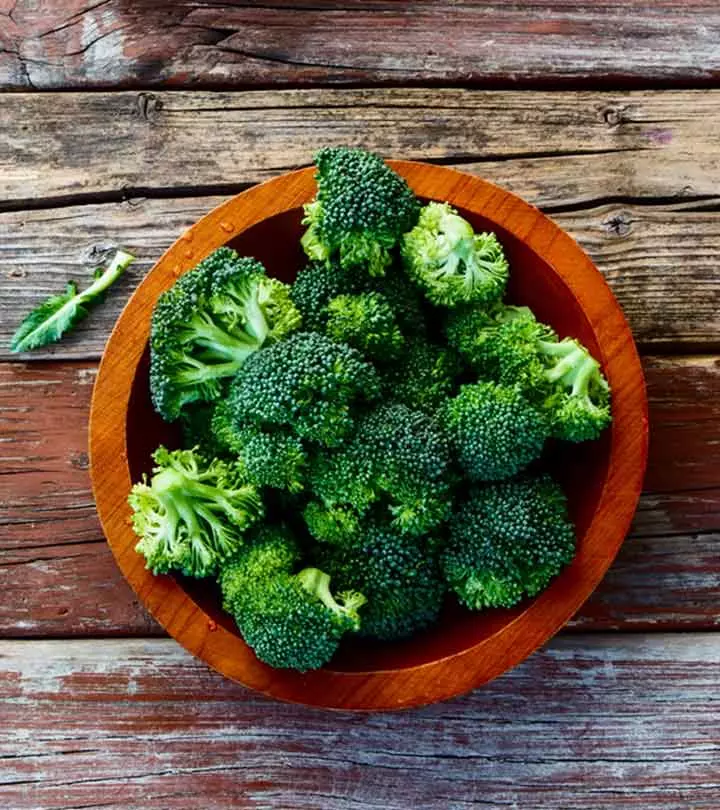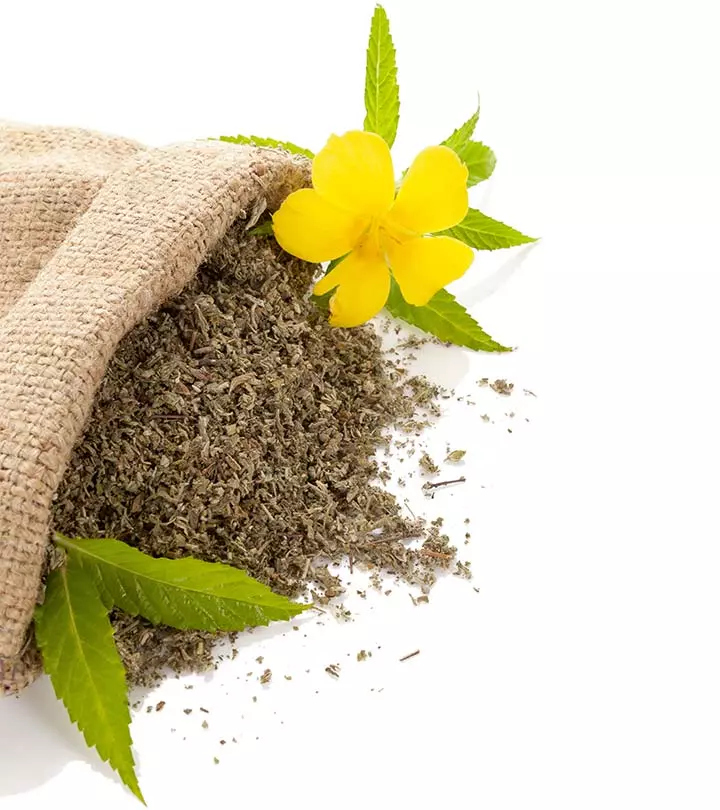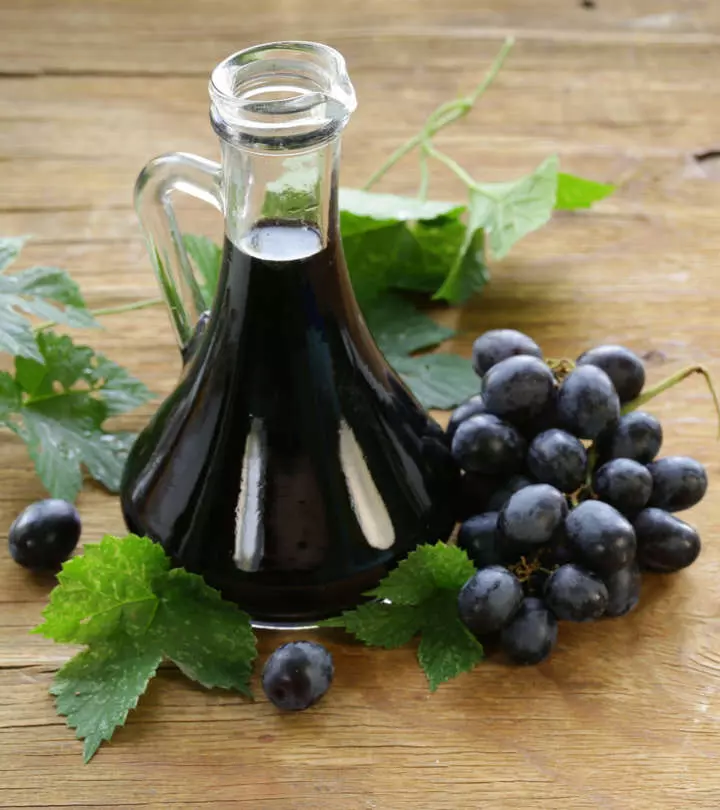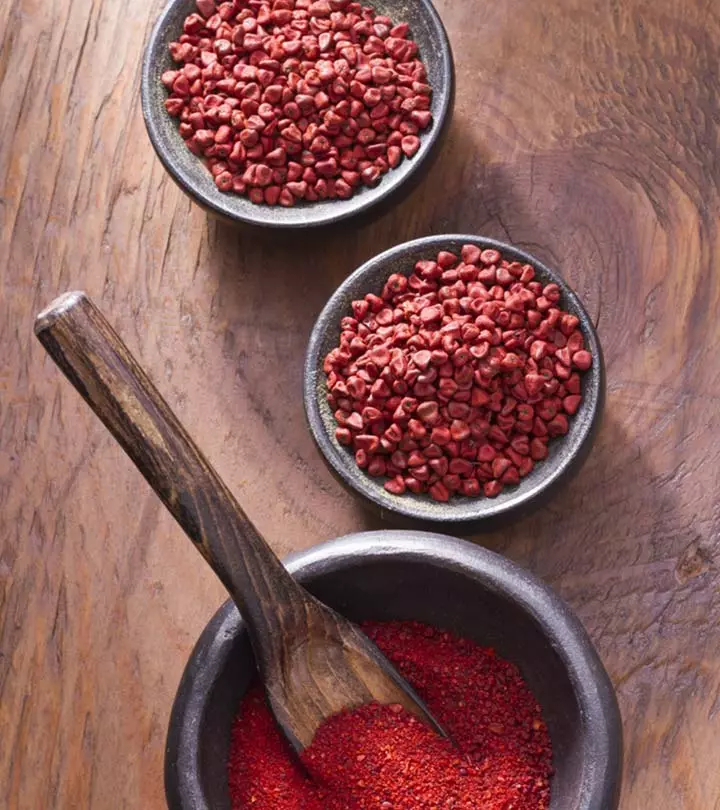21 Amazing Benefits Of Bell Peppers And Their Nutritional Value
Red, green, orange, and yellow — add all colors to your diet for a healthy dash of flavor.

Image: iStock
The benefits of bell peppers are attributed to their nutritional content. They are popularly known as capsicum or sweet peppers, and they are used in many different cuisines worldwide. They are known as Shimla Mirch in Hindi, Kuda Milagai in Tamil, Pedda Mirappa in Telugu, Parangi Mulagu in Malayalam, Bhopli Mirchi in Marathi, Simla Marchan in Gujarati, Simla Mirch in Bengali, and Donne Menasinakai in Kannada.

Bell peppers are abundantly available in summers and are known for their unique taste. With the increase in their ripeness, their vitamin C content also increases greatly.
 Know Your Ingredient: Bell Peppers
Know Your Ingredient: Bell PeppersWhat Is It?
Popularly known as capsicum or sweet pepper, bell pepper has a tangy taste and is available in different colors.
What Are Its Benefits?
It aids in the detoxification of the body and treats gastrointestinal disorders while also stimulating and supporting hair and skin health.
Who Can Use It?
Anyone can eat bell peppers except those who are allergic to them.
How Often?
Bell Peppers can be consumed daily in moderation.
Caution
Bell peppers may disrupt nerve function and may aggravate the symptoms of rheumatoid arthritis and osteoarthritis.
Capsaicin is the component that gives peppers their unique hot taste. But in bell peppers, it is present in very small amounts, which gives them a mild spicy taste that is quite tolerable. Bell peppers are available in different colors: purple, orange, green, yellow, and red. They belong to the nightshade (Solanaceae) family of plants, consisting of cayenne pepper, eggplant, potatoes, tomatoes, and chili pepper. This plumpy and bell-shaped vegetable was cultivated around 900 years ago in South and Central America. The European colonizers of North America gave the name ‘pepper’ to it. It is known as Capsicum annuum scientifically. They have a crunchy texture and tangy taste and grow in any climate. Orange, yellow, and red peppers are sweet and fruity, whereas purple and green peppers have a slightly bitter taste.
Learn more about bell peppers and their array of benefits from the article below. Keep reading to know more!
 Trivia
TriviaIn This Article
Health Benefits Of Bell Pepper

Apart from imparting flavor and attractiveness to bland dishes, are bell peppers good for you? Yes! Bell peppers are loaded with nutrients like vitamins A, C, and K, carotenoids, and dietary fiber which makes them immensely beneficial for overall good health (1). Bell peppers also have vitamin B6 and folate that help to lower homocysteine levels, thus reducing the risk of heart disease (2). Some of the bell pepper benefits are given below:
1. Good For The Eyes
There are numerous red bell pepper benefits one can avail, starting with healthy eyesight. Peppers are rich in vitamin A that may help promote sharp eyesight and improve night vision (3). They are a rich source of a carotenoid called lutein that helps lower the risk of macular degeneration. Macular degeneration of eyes is the most common cause of age related visual loss (4). Bell peppers also protect your eyes from cataracts due to their high levels of beta-carotene and vitamin C (5).
2. May Help Burn Calories
Red bell peppers help in activating thermogenesisi The process of heat production in a human or animal body that happens as a consequence of energy dissipation. and increase the metabolic rate. Capsaicin, which is responsible for increasing the hotness of other peppers, is found in bell peppers in very small amounts. Some believe this small amount of capsaicin may have a mild thermogenic action that increases metabolism, which may support weight loss (6). However, it is important to note that capsaicin in bell peppers is untraceable (7), so it may not significantly impact metabolism or weight loss.
That said, bell peppers may still help you in your weight loss journey as they are low in calories (1). By adding them to your diet, you can easily maintain the calorie deficit needed to lose weight. Adding bell peppers to your meals can also boost the flavor of low-calorie dishes, making them, and your weight management journey, more enjoyable and satisfying. You can add them in salads and stir-fries or even consume them raw with a healthy dip or hummus to fully enjoy their benefits.
3. May Help Reduce The Risk Of Cancer
Being rich in antioxidant and anti-inflammatory nutrients, bell pepper provides several anti-cancer benefits (8). The risk of cancer increases due to chronic excessive inflammation and chronic unwanted oxidative stress (9). These factors can be offset with regular intake of phytonutrientsi Compounds present in plants that possess antioxidant qualities and help prevent cellular deterioration in the human body. having antioxidant and anti-inflammatory properties. Moreover, bell peppers also contain health supportive sulfur compounds. The enzymes in bell pepper help in gastric and esophageal cancer prevention. The carotenoid lycopene is found to be effective in the prevention of prostate, bladder, cervix and pancreas cancer (10).
4. Cardiovascular Benefits
Red bell peppers are rich in lycopene, thus making them excellent for a healthy heart whereas green bell peppers are a good source of cholesterol lowering fiber (11), (12). Increased homocysteinei An amino acid, the high levels of which can damage arterial linings and elevate blood clot risk. levels can lead to a higher risk of heart disease. Bell peppers contain vitamin B6 and folate which help to lower homocysteine levels (2). In addition to these, the powerful antioxidants vitamins A and C present in these vegetables help to wipe out free radicals, unstable molecules/atoms in the body that can damage DNA in cells, increasing the risk of disease (13). The potassium in bell peppers lowers blood pressure, which is also beneficial for the heart (14). Further, these improved markers can potentially also reduce the risk of diabetes.
5. Supports The Immune System
Vitamin C is vital for maintaining a healthy immune system and for building strong collagen to support skin and joints. It is instrumental in lowering the risk of arthritis and reducing inflammation (15). Vitamin K aids in the formation of blood clots. It is important for developing strong bones and protection of cells from oxidative damage (16).
6. Great Source Of Vitamin B6 And Magnesium

The combination of vitamin B6 and magnesium leads to decrease in anxiety levels, particularly due to premenstrual symptoms (17). Being a natural diuretic, vitamin B6 helps to reduce bloating and prevents hypertension (18).
7. May Increase Iron Absorption In The Body
Red bell peppers provide almost 300 percent of the daily vitamin C requirement. Vitamin C is essential for the proper absorption of iron (19). Thus, those suffering from iron deficiency should consume red peppers.
8. Powered By The Benefits Of Capsaicin
Capsaicin is found in the white membranes of peppers and is responsible for imparting heat to the seeds as well. It lowers the cholesterol levels and triglycerides (20). It kills the ulcer causing bacteria in the stomach and boosts immunity (21). However, it is important to note that capsaicin in bell peppers is untraceable. So, it is best to turn to spicier pepper varieties, such as cayenne or chili peppers, for a more concentrated source of capsaicin (7).
9. Has Detoxifying Properties
Bell peppers help in clearing out the congested mucus membranes in the nose and lungs and eliminate toxins through sweating. Many believe that this may be due to the small amount of capsaicin found in bell peppers. However, research suggests that this amount is untraceable (7), so there is no scientific basis for this claim.
10. Offer Benefits Of Potassium
Bell peppers are good sources of potassium. This mineral helps in keeping the fluids and minerals balanced in the body. It enhances muscle function and helps regulate blood pressure (22).
11. Other Benefits
Bell pepper juice has proven to be effective in curing gastrointestinal disorders such as ulcers, diarrhea and dyspepsiai Also known as indigestion, whose symptoms include a burning sensation in the stomach, bloating or gassiness, and nausea. . It also lowers the incidence of several respiratory problems such as emphysemai A lung condition where the air sacs in the lungs start getting damaged and lead to shortness of breath. , asthma and infections in the lungs. Drinking bell pepper juice is an effective remedy against sore throats and nose bleeds. Research suggests that capsaicin usually provides all these benefits (21), (23), and (24). Since capsaicin is untraceable in bell peppers, these claims have no scientific basis.
Leslie, a blogger, shared how they did her more harm than good. She said, “I’d eat a dish with bell peppers and feel like my upper stomach was on fire. After dinner, I’d go to sleep and wake up shortly after gasping for air because my stomach was so irritated (i).” She talked about it to her doctor who suggested that it could be an allergic reaction. Later, she found out that this reaction occurred due to the capsaicin in bell peppers that irritated her gut.
Key Takeaways
- Bell peppers are rich in vitamin C, which can improve skin health while reducing aging signs.
- Eating bell peppers can encourage healthy hair growth and enhance its texture.
- Their anti-inflammatory qualities can help lower the risk of conditions like cancer and heart disease.
- Due to their low calorie and high fiber content, they help regulate your weight and maintain a healthy digestive tract.
Hair Benefits Of Bell Pepper

Getting healthy, long and thick hair is everyone’s dream. But unfortunately an unhealthy lifestyle and lack of proper supply of nutrients in the diet often lead to several hair problems like hair thinning, dandruff, split ends and hair loss. Now this might appear strange, but bell pepper can support hair growth by improving the circulation of blood to the scalp. Given below are the benefits of bell peppers for hair.
12. High Silicon Supports Hair And Nails
Green bell pepper has a high content of natural silicon, which may support healthy hair and nails (25).
13. Stimulates Hair Growth
By stimulating circulation, bell peppers improve the effectiveness of other herbs. Red bell pepper is a natural hair growth stimulator and is highly effective in curing hair loss. Consuming capsicum benefits individuals, in case of hair loss, as it improves blood flow which is vital for the proper growth of hair and the protection of hair follicles from the effects of dihydrotestosterone (DHT). However, no substantial evidence suggests that bell peppers can directly block DHT and aid hair growth.
14. Strengthens Hair Follicles
One of the reasons why bell peppers plants and the fruits are good for hair is the fact that they are excellent sources of vitamin C which is essential for hair health. Vitamin C helps in proper absorption of iron, thus ensuring that there is enough iron in red blood cells to carry oxygen to hair follicles (15). Vitamin C is also used in the formation of collagen. Collagen is required by hair follicles, blood vessels and skin to stay healthy and for their optimal growth. Vitamin C deficiency can cause dry, splitting hair that breaks easily (26), (27).
15. Enhances Hair Health
Anecdotal evidence suggests that applying bell pepper on hair can be effective in triggering hair growth through the improvement of blood circulation in the scalp. Boil a few dry red bell peppers in water and leave it for 5 to 6 minutes. After cooling it, massage it on your scalp with the help of a cotton pad and leave it for 10 to 15 minutes. Then wash off the hair. This should be done twice a week for best results. The spiciness of bell pepper enhances the growth and health of the hair. However, relevant studies are needed to prove the claim.
Skin Benefits Of Bell Pepper

A healthy and radiant skin plays an important role in enhancing the overall appearance. Some of the common skin problems faced today by many people are the appearance of wrinkles, discolouration, thickening and decrease in elasticity. Though genetics largely determines when the skin starts showing signs of aging, there can be other causes as well, such as skin damage and unhealthy lifestyle. Oxidation is a chemical process in which the free radicals steal electrons from healthy cells, thereby causing skin damage. Most of the skin damage occurs due to exposure to smoking and sunlight (28). This is where the benefits of bell peppers for the skin come into play. Check them out below.
16. Fights Oxidative Damage
Red, green and yellow bell peppers are rich in vitamin C which helps in the production of collagen. Collagen keeps the skin firm and protects the cells from further damage. It increases the ability of the skin to fight against oxidative damage (26).
17. Helps Keep The Skin Healthy And Youthful
The antioxidants and phytochemicalsi Chemical substances produced by plants that usually aid in their resistance to diseases by fungi and bacteria. present in bell pepper juice makes the skin healthy and youthful. They help fight free radicals, reducing oxidative stress and preventing premature aging (13).
18. Soothes Shingles And Athlete’s Foot
Due to their antifungal and antibacterial properties, bell peppers can alleviate infections like shingles and athlete’s foot in combination with proper medication. However, there are no scientific studies supporting this claim.
19. May Delay Aging
Consumption of bell pepper juice helps in delaying the appearance of the signs of aging due to its high antioxidant levels. Bell peppers protect the skin from damage-causing free radicals, thus promoting healthy and younger looking skin (13).
20. May Help Clear Skin Blemishes And Rashes
Bell peppers are rich in vitamin C, which helps block an enzyme called tyrosinase that helps create melanin, the pigment that gives skin its color. This may help fade dark spots, blemishes, and rashes (26).
A mixture of carrot and green bell pepper juice can be very effective in clearing blemishes and rashes on the skin.
21. May Help Brighten The Skin
Many believe that the capsaicinoids in bell peppers have antioxidant and anti-inflammatory properties that may help reduce inflammation and oxidative damage (29). This compound may also help reduce sensitivity to the sun and improve skin hydration, texture, and elasticity. However, capsaicinoids in bell peppers are untraceable (7). Instead, they are rich in vitamin C which may help prevent dark spots and shield the skin from UV-induced skin damage and aging. Vitamin C also helps prevent excessive skin pigmentation by inhibiting melanin production, the pigment responsible for skin color (30). Therefore, bell peppers may help brighten the skin and impart a natural glow to it.
 Fun Fact
Fun FactNutritional Value Of Bell Peppers

All peppers are a good source of vitamins A, C, and K. However, the red ones are the highest in nutritional value. Red peppers also contain carotenoidsi A group of bright yellow, red, or orange pigments with antioxidant properties that render color to fruits and vegetables. , such as lycopene and beta-cryptoxanthin. They are rich in phytochemicals and have a significant amount of fiber (31). A substance capsaicin which occurs in the white membranes of other peppers is present in lesser amounts in bell peppers (7). Some of the nutrients available in bell peppers are given below.
Bell Pepper Nutritional Chart, USDA:
| Peppers, sweet, green, raw | |
|---|---|
| Nutritional value per 100 g (3.5 oz) | |
| Energy | 84 kJ (20 kcal) |
| Carbohydrates | 4.64 g |
| – Sugars | 2.4 g |
| – Dietary fiber | 1.7 g |
| Fat | 0.17 g |
| Protein | 0.86 g |
| Vitamin A equiv. | 18 μg (2%) |
| – beta-carotene | 208 μg (2%) |
| – lutein and zeaxanthin | 341 μg |
| Thiamine (vit. B1) | 0.057 mg (5%) |
| Riboflavin (vit. B2) | 0.028 mg (2%) |
| Niacin (vit. B3) | 0.48 mg (3%) |
| Pantothenic acid (B5) | 0.099 mg (2%) |
| Vitamin B6 | 0.224 mg (17%) |
| Folate (vit. B9) | 10 μg (3%) |
| Vitamin C | 80.4 mg (97%) |
| Vitamin E | 0.37 mg (2%) |
| Vitamin K | 7.4 μg (7%) |
| Calcium | 10 mg (1%) |
| Iron | 0.34 mg (3%) |
| Magnesium | 10 mg (3%) |
| Manganese | 0.122 mg (6%) |
| Phosphorus | 20 mg (3%) |
| Potassium | 175 mg (4%) |
| Sodium | 3 mg (0%) |
| Zinc | 0.13 mg (1%) |
| Fluoride | 2 µg |
- Vitamin C: Bell peppers are rich in vitamin C. In fact, they contain more than double the amount of vitamin C found in citrus fruits. A cup of chopped bell peppers provides more than 100 percent of the recommended daily allowance (RDA) of antioxidant vitamin C which is essential for tissue health and immunity (15).
- Vitamin A: Vitamin A is vital for vision, red blood cell production and a healthy immune system (3). A cup of chopped bell peppers provides more than a day’s requirement of vitamin A. Green bell peppers contain 551 international units of vitamin A per 149 grams whereas red bell peppers provide 4666 IU of vitamin A which is almost equivalent to a day’s requirement based on a 2000 calorie diet.
- Carotenoids: Different types of carotenoid nutrients like lycopene, luteine, cryptoxanthin, zeaxanthin, alpha-carotene and beta-carotene are present in bell peppers. Yellow, red and orange bell peppers are rich in carotenoids. The availability of carotenoids depends upon the ripening of this vegetable.
- Calories: Bell peppers are low in calories, providing around 30 to 40 calories per cup of chopped pepper. Due to their sweet and crunchy flavour, they can be a good substitute for high-calorie chips.
- Fiber: Intake of fiber is vital for digestion and reduces the risk of constipation and hemorrhoidsi Also known as piles, this is a condition where the veins in the anus and lower rectum swell and cause pain. (32). The daily recommendation of fiber is 21 to 25 grams for women and 30 to 38 grams for men. A cup of green bell pepper provides about 2.5 grams of fiber.
These nutrients make bell peppers one of the best foods to include in your diet. If you are unsure how to add them to your meal plan, check out the next section.
Cooking And Preparation Tips
- Slice bell peppers and add them to salads for a crunchy bite and fresh flavor.
- Add chopped bell peppers to stir-fries. They cook quickly and add color to the dish.
- Roast bell peppers in the oven for a sweet, smoky flavor. Just toss them with a bit of olive oil and seasoning before roasting.
- Remove the inner seed core and stuff whole bell peppers with rice, beans, or meat for a delicious main dish. Bake them until tender.
- Grill bell peppers for a charred taste. Cut them into halves or quarters, brush with oil, and grill until soft.
- Sauté sliced bell peppers with onions and spices as a tasty side dish or topping for tacos and sandwiches.
- If you have extra bell peppers, you can chop and freeze them for later use in soups, stews, or casseroles.
Need more inspiration? Check out the next section for some easy recipes you can try to enjoy the benefits of bell peppers.
Bell Pepper Recipes
Sauteed Bell Peppers
Ingredients
- 3 bell peppers, thinly sliced
- 1½ tablespoons olive oil
- ½ teaspoon salt
- ¼ teaspoon pepper
How To Prepare
- Heat oil in a pan over medium heat.
- Add the sliced peppers and saute for 5-6 minutes or until the bell peppers are tender.
- Season with salt and pepper and enjoy.
Stuffed Bell Peppers
Ingredients
- 3 bell peppers
- 1 cup tofu, crumbled
- 1 onion, finely chopped
- ½ teaspoon ginger-garlic paste
- ½ tomato, finely chopped
- 2 tablespoons olive oil
- 1 teaspoon salt
- ½ teaspoon pepper
- 1 tablespoon parsley, finely chopped
How To Prepare
- Preheat the oven to 350°F.
- Heat 1 tablespoon of oil in a pan and add onion and ginger-garlic paste.
- Saute for 3-4 minutes and add chopped tomato.
- Saute for another 1-2 minutes, and add salt, pepper, and tofu.
- Simmer for 5 minutes and keep stirring occasionally.
- Cut off the tops of the bell peppers and remove the seeds.
- Stuff them with the tofu filling.
- Place the stuffed bell peppers in a casserole dish and brush with oil.
- Bake for 20 minutes or until they soften and are slightly brown.
- Garnish with parsley, and enjoy!
This recipe is perfect for vegans and vegetarians. You may also replace tofu with tempeh, soy chunks, and lentils. For animal-based protein alternatives, try ground chicken or turkey.
Though it is a healthy addition to your diet, there are a few side effects you need to know about before including them in your meal plan. Read on to learn about the potential risks of using bell peppers.
Risks And Considerations
When using bell peppers, it is important to be aware of potential allergies or intolerances.
- Some people may have allergic reactions to bell peppers, causing symptoms like itching, swelling, or digestive issues.
- Most people experience mild symptoms such as a tingling or spicy sensation.
Scientists found that all bell peppers have a protein called profilin, which can trigger allergies, especially in people allergic to birch pollen. About half of the bell pepper types also had another allergen similar to one found in birch pollen called Bet v 1, which can cause reactions in sensitive individuals. Another allergen, P23, found in tomatoes was also present in some bell peppers (33).
If you notice any unusual reactions after eating them, it is best to avoid them and consult a healthcare professional. Wash bell peppers thoroughly before eating to remove any pesticides or dirt and ensure safe consumption. Eating them in moderation is usually safe for most people, and cooking them can help reduce the risk of any gastrointestinal discomfort.
Infographic: DIY Bell Pepper Face Mask
The presence of vitamin C in bell pepper makes it excellent for fighting several skin issues. From treating oxidative damage to wrinkles, bell pepper can do wonders. Apart from including it in your diet as a seasoning, you can also avail its benefits through face masks.
Check out the infographic below to learn how to prepare a DIY bell pepper face mask that may help solve your skin care woes. Illustration: StyleCraze Design Team
Bell peppers or capsicum are widely used in a variety of cuisines around the world. Rich in vitamin C and capsaicin, bell peppers have a sweet and mild peppery taste. Along with adding their subtle heat and flavor, bell peppers are known for their many health benefits. A good source of carotenoids, bell peppers are good for your eyes and heart health. Other benefits of bell peppers are that they help manage your weight, combat iron deficiency, and aid in the detoxification of your system as well. Bell pepper benefits are also pronounced in improving your skin and hair health and texture. Low in calories, and high in nutrients, bell peppers make for a healthy addition to your meals.
Frequently Asked Questions
Are bell peppers good to eat every day?
Yes, bell peppers are good to eat every day. They are rich in vitamin C, fiber, and iron, which can manage iron deficiency, improve iron absorption, and help manage constipation. However, consume them in moderation.
Are bell pepper and capsicum the same?
Bell pepper and capsicum have a minor difference. While capsicum contains capsaicin that may trigger a burning sensation, bell peppers lack this chemical.
Are bell peppers good to eat raw?
Yes, bell peppers can be consumed raw. They go well with meat or spinach or can be easily added to salads.
What does green pepper do to a woman?
There are countless green pepper benefits that improve women’s health. These peppers have a decent amount of fiber, iron, and vitamin C that help promote a woman’s overall health and reduce the risk of anemia.
Are bell peppers healthier raw or cooked?
The benefits of bell peppers can be reaped if they are slightly cooked. However, deep-frying them destroys the nutrients like vitamin C. Hence, stir fry them to make use of their beneficial nutrients.
Do bell peppers have any side effects?
Bell peppers contain solanine and alkaloids, which may disrupt nerve function in a few. These may also aggravate the symptoms of rheumatoid arthritis and osteoarthritis (34). Hence, caution is advised.
Are peppers good for you?
Yes, peppers are actually pretty good for your health and have loads of benefits. They are low in calories and is rich in vitamins A and C, potassium, and fiber. They also have a ton of antioxidants, which can help you stay healthy and ward off diseases like cancer and heart disease.
Illustration: Amazing Benefits Of Bell Peppers And Their Nutritional Value

Image: Stable Diffusion/StyleCraze Design Team
Bell peppers are good sources of vitamins and minerals. Watch the video below to learn about how they can be beneficial for your overall health and nutrition.
Personal Experience: Source
StyleCraze's articles are interwoven with authentic personal narratives that provide depth and resonance to our content. Below are the sources of the personal accounts referenced in this article.
i. Bell pepper reactionhttps://healinggastritisnaturally.wordpress.com/2025/02/26/bell-peppers-reaction/
References
Articles on StyleCraze are backed by verified information from peer-reviewed and academic research papers, reputed organizations, research institutions, and medical associations to ensure accuracy and relevance. Read our editorial policy to learn more.
- Peppers bell green raw
https://fdc.nal.usda.gov/food-details/2258588/nutrients - Homocysteine lowering and cardiovascular disease risk: Lost in translation
https://pmc.ncbi.nlm.nih.gov/articles/PMC2651913/ - The Role of Vitamin A in Retinal Diseases
https://pmc.ncbi.nlm.nih.gov/articles/PMC8835581/ - Lutein and Zeaxanthin and Their Roles in Age-Related Macular Degeneration—Neurodegenerative Disease
https://pmc.ncbi.nlm.nih.gov/articles/PMC8874683/ - Age-related Cataract in a Randomized Trial of Vitamins E and C in Men
https://pmc.ncbi.nlm.nih.gov/articles/PMC3051399/ - The Effects of Capsaicin and Capsiate on Energy Balance: Critical Review and Meta-analyses of Studies in Humans
https://pmc.ncbi.nlm.nih.gov/articles/PMC3257466/ - Characterization of Different Capsicum Varieties by Evaluation of Their Capsaicinoids Content by High Performance Liquid Chromatography Determination of Pungency and Effect of High Temperature
https://pmc.ncbi.nlm.nih.gov/articles/PMC6269802/ - Effects of yellow and red bell pepper (paprika) extracts on pathogenic microorganisms cancerous cells and inhibition of survivin
https://pmc.ncbi.nlm.nih.gov/articles/PMC7925738/ - Oxidative stress inflammation and cancer: How are they linked?
https://pmc.ncbi.nlm.nih.gov/articles/PMC2990475/ - The role of carotenoids in the prevention of human pathologies
https://pmc.ncbi.nlm.nih.gov/articles/PMC6361147/ - Lycopene in the Prevention of Cardiovascular Diseases
https://pmc.ncbi.nlm.nih.gov/articles/PMC8880080/ - Bell Peppers (Capsicum annum L.) Losses and Wastes: Source for Food and Pharmaceutical Applications
https://pmc.ncbi.nlm.nih.gov/articles/PMC8434037/ - Free radicals antioxidants and functional foods: Impact on human health
https://pmc.ncbi.nlm.nih.gov/articles/PMC3249911/ - Effect of increased potassium intake on cardiovascular risk factors and disease: systematic review and meta-analyses
https://pmc.ncbi.nlm.nih.gov/articles/PMC4816263/ - Vitamin C in Disease Prevention and Cure: An Overview
https://pmc.ncbi.nlm.nih.gov/articles/PMC3783921/ - Vitamin K Contribution to DNA Damage—Advantage or Disadvantage? A Human Health Response
https://pmc.ncbi.nlm.nih.gov/articles/PMC9611527/ - Effects of Magnesium and Vitamin B6 on the Severity of Premenstrual Syndrome Symptoms
https://pmc.ncbi.nlm.nih.gov/articles/PMC4161081/ - Vitamin B6 (Pyridoxine)
https://www.ncbi.nlm.nih.gov/books/NBK557436/ - Biochemistry Iron Absorption
https://www.ncbi.nlm.nih.gov/books/NBK448204/ - Capsaicin Supplementation Improved Risk Factors of Coronary Heart Disease in Individuals with Low HDL-C Levels
https://pmc.ncbi.nlm.nih.gov/articles/PMC5622797/ - Capsaicin Inhibits Inflammation and Gastric Damage during H pylori Infection by Targeting NF-kB–miRNA Axis
https://pmc.ncbi.nlm.nih.gov/articles/PMC9227394/ - Potassium
https://ods.od.nih.gov/factsheets/Potassium-HealthProfessional/ - Capsaicin Protects Against Lipopolysaccharide-Induced Acute Lung Injury Through the HMGB1/NF-κB and PI3K/AKT/mTOR Pathways
https://pmc.ncbi.nlm.nih.gov/articles/PMC8524366/ - A review of the effects of Capsicum annuum L. and its constituent capsaicin in metabolic syndrome
https://pmc.ncbi.nlm.nih.gov/articles/PMC6000222/ - Use of silicon for skin and hair care: an approach of chemical forms available and efficacy
https://pmc.ncbi.nlm.nih.gov/articles/PMC4938278/ - Vitamin C in dermatology
https://pmc.ncbi.nlm.nih.gov/articles/PMC3673383/ - Vitamin C Deficiency
https://www.ncbi.nlm.nih.gov/books/NBK493187/ - Oxidative Stress in Aging Human Skin
https://pmc.ncbi.nlm.nih.gov/articles/PMC4496685/ - Protective effects of Capsicum fruits and their constituents on damage in TNF-α-stimulated human dermal fibroblasts
https://pubmed.ncbi.nlm.nih.gov/36325913/ - Bioactive Compounds for Skin Health: A Review
https://www.ncbi.nlm.nih.gov/pmc/articles/PMC7827176/ - Red pepper (Capsicum annuum) carotenoids as a source of natural food colors: analysis and stability—a review
https://pmc.ncbi.nlm.nih.gov/articles/PMC4348314/ - High Fiber Diet
https://www.ncbi.nlm.nih.gov/books/NBK559033/ - Bell peppers (Capsicum annuum) express allergens (profilin pathogenesis-related protein P23 and Bet v 1) depending on the horticultural strain
https://pubmed.ncbi.nlm.nih.gov/9652302/ - The evaluation of nightshade elimination diet (NED) on inflammatory and rheumatologic markers of rheumatoid arthritis patients: study protocol for a randomized controlled trial
https://pmc.ncbi.nlm.nih.gov/articles/PMC11316282/
Read full bio of Dr. Pallavi Srivastava
Read full bio of Tanya Choudhary
Read full bio of Ravi Teja Tadimalla
Read full bio of Moksha Gandhi



























Community Experiences
Join the conversation and become a part of our empowering community! Share your stories, experiences, and insights to connect with other beauty, lifestyle, and health enthusiasts.